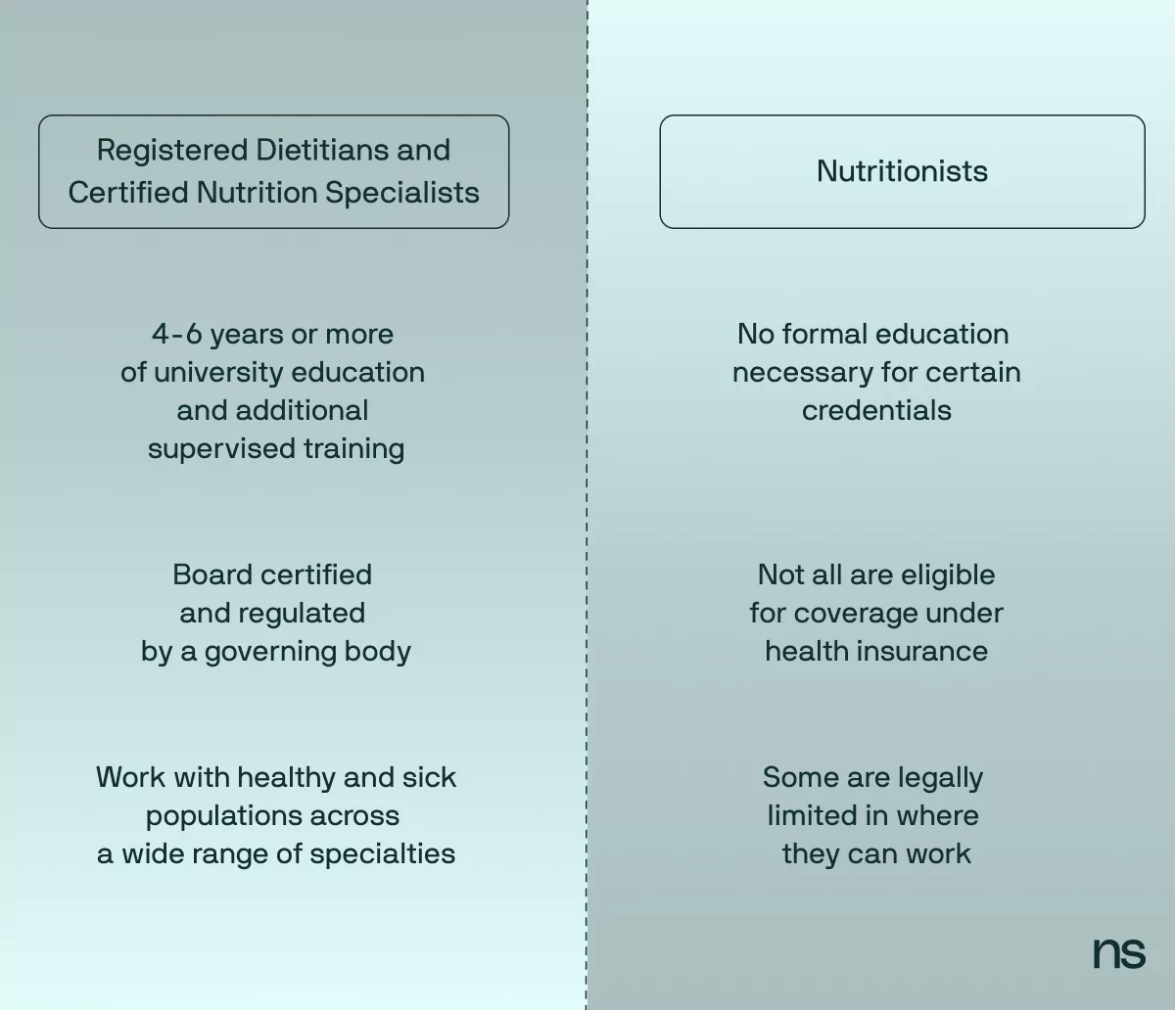Dietitian vs Nutritionist: The Difference, And Who to Work With
.webp)
Key Takeaways
Confused about whether to work with a dietitian or a nutritionist? You’re not alone. From RDs to CNS, and health coaches to holistic nutritionists, titles for those who offer nutrition advice vary—and so does the level of training!
If you're trying to provide healthy eating advice, offer tailored meal plans instead of generic advice, help you manage a health condition, or just get real expert guidance, here's what you need to know.
What is a Nutritionist?

You may have heard of certified nutrition specialists, holistic nutritionists, and other types of nutrition experts. All the nutrition credentials technically fall under the extremely broad heading of “nutritionist,” but not all meet the qualifications provided by specific credentials and may not be able to legally add “licensed” or “certified” to their titles without specific training.
Someone with little to no evidence-based training in nutrition science, biochemistry, or clinical nutrition can call themselves a nutritionist without the other titles attached, and you may not get the best health advice from them for your needs. This is why it’s important to learn more about the credentials and training someone might have before you get nutrition advice.
What is a Dietitian?
A registered dietitian (RD) or registered dietitian nutritionist (RDN) is a highly trained and qualified nutrition professional. The RD/RDN designation is administered by the Commission on Dietetic Registration, the credentialing agency for the Academy of Nutrition and Dietetics. It requires a minimum of a master’s degree in nutrition science or public health degree with a nutrition focus and a Dietetic Internship (DI), which includes supervised experience.
ACEND (Accreditation Council for Education in Nutrition and Dietetics) requires that you gain at least 1200 hours of supervised pre-professional experience as the last step before being eligible to take (and pass, of course!) the Registration Examination for Dietitians. If desired, RDs/RDNs may go on to complete specialized board certification in seven different areas such as:
- Renal Nutrition (CSR)
- Pediatric Nutrition (CSP)
- Sports Dietetics (CSSD)
- Gerontological Nutrition (CSG)
- Oncology Nutrition (CSO)
- Obesity and Weight Management (CSOWM)
- Pediatric Critical Care Nutrition (CSPCC)
In order to maintain the RD/RDN credential, dietitians must complete regular continuing professional education credits within a designated number of years.
Is There a Difference Between a Registered Dietitian (RD) and Registered Dietitian Nutritionist (RDN)?
There is no real difference between RD and RDN titles. So why do they both exist? For many years, registered dietitians used only the RD credential, but in 2013, the credential was extended to include RDN.
According to the Commission on Dietetic Registration, the addition of the “N” to the RD was done to communicate a broader concept of wellness (including prevention of health conditions beyond medical nutrition therapy) as well as treatment of conditions.
What is a Certified Nutrition Specialist?

A Certified Nutrition Specialist, or CNS, is another highly qualified and trained nutrition professional. The Certified Nutrition Specialist (CNS) designation is administered by the Board for Certification of Nutrition Specialists (BCNS), the certifying arm of the American Nutrition Association.
Many states accept the CNS credential or exam for licensure purposes. To qualify for the credential, applicants must have at least a master’s degree, complete 1,000 hours of supervised experience, and pass an exam.
To obtain a CNS, you may also be a licensed professional with an MD, DO, DDS, DPM, OD, DC, Pharm.D, DPT, or Doctor of Nursing degree and have 50 hours of continuing education hours in nutrition as well as passing the exam.
To maintain the CNS credential, these nutritionists must also complete continuing education credits within a designated number of years.
What is a Certified Clinical Nutritionist?
The Certified Clinical Nutritionist (CCN) is another credential you may come across. However, The CCN certification has no supervised practice requirement and may not be eligible for licensure in most states.
To obtain the CCN credential, you must successfully complete the Certified Clinical Nutritionist Examination. In addition, you must satisfy the core requirements that include obtaining a Bachelors of Science or Advanced Professional Degree in Licensed Health Care Field or Masters, Ph.D or D.Sc. in Human Nutrition. You must also complete the Post Graduate Studies in Clinical Nutrition Program (PGSCN), which involves around 56 hours of online coursework.
Why Nutritionists and Dietitians at Nutrisense Stand Out
So, who should you see for your health needs? You can technically work with anyone who has the right certification requirements and education credits, but that’s just one part of the picture.
You also need someone who has the practical experience, specializations in a related field to your health goals (whether that’s prediabetes, sports nutrition, weight loss, gut health or just general wellness) and someone who understands and works with you, not with generic ‘best practices.’
That’s the team we’ve built at Nutrisense! All Nutrisense coaches are Registered Dietitians (RDs) or Certified Nutrition Specialists (CNS), with advanced training in functional nutrition, metabolism, and glucose regulation. This sets the team apart from other private-practice or on-demand nutritionists and telehealth platforms.
The team also goes through Nutrisense’s glucose certification course, ensuring they’re not just trained in clinical settings, but with insider knowledge and hands-on applications based on insights from over 100,000 members.
So you can be sure your coach won’t just talk through a meal plan during your 1:1 video call—they’ll review your glucose data, analyze your body’s responses to food, stress, sleep, and exercise, and help you make evidence-backed changes that last.
Nutritionist vs Dietitian Credentials: Who's Actually Qualified?
Now that you know more about some of the more common nationally-recognized nutrition credentials, you might be wondering about various other certifications and who you should trust for overall health guidance.
For example, while people who have credentials like Nutritional Therapy Practitioner (NTP/NTC), Certified Nutritionist Consultant (CNC) or Board Certified Holistic Nutritionist (BCHN) can be a helpful addition to your healthcare team, remember only licensed providers—typically RDs or CNSs—can create clinical nutrition plans tailored to your health status and goals. Health coaches or uncertified nutritionists may offer generic tips, but they can’t diagnose or treat conditions, and are usually not nutritionists covered by insurance.
Make sure that you work with a dietitian or nutritionist who:
- Is a licensed RD or CNS
- Has clinical training and supervised experience
- Can provide personalized nutrition therapy
- Understands your specific goals (like glucose, weight, or hormones)
- Uses data and evidence-based recommendations—not guesswork—to guide decisions
Scope of Practice
Customized nutrition coaching plans for personalized support are important for reaching your goals. However, not everyone will be legally able to provide those plans.
Depending on the state licensure laws, RDs/RDNs and/or CNS will be the credentials primarily required for nutritionists in order to provide custom medical nutrition therapy guidance. Many states and insurance providers place limitations on specific nutrition counseling.
Remember, online nutritionists or health coaches aren’t qualified to provide personalized, clinical guidance—especially if you’re navigating prediabetes, need medical nutrition therapy, have hormonal imbalances, weight loss resistance, or glucose instability.
Bottom Line: Look for More Than a Title

Whether you're trying to reverse prediabetes, improve blood sugar, or optimize your diet long-term, your results depend on who you work with. That’s why Nutrisense only partners with board-credentialed experts! The registered dietitians and certified nutrition specialists on the team are licensed experts who combine data insights with evidence-based nutrition to guide you every step of the way.
Find the right Nutrisense programto turn insight into progress.
FAQs about a Dietitian vs Nutritionist
Have more questions? Our expert team answers some frequently asked questions about the more nitty gritty differences between a dietitian and a nutritionist, so you’re prepared to pick the right person for your health goals.
Are all nutrition education programs the same?
No. Nutrition education varies widely—from brief online health coach courses to multi-year accredited graduate degrees. For example, a Registered Dietitian (RD) must complete a master’s degree, 1200+ hours of supervised training, and pass a board exam. In contrast, many health coaches complete non-accredited programs that may only last a few weeks or months.
Can someone be a nutritionist without formal training?
Yes. In many states, the term “nutritionist” isn’t legally protected—so people without formal training or licensure can use it freely. That’s why it’s important to look for licensed credentials like RD, RDN, or CNS if you want personalized nutrition therapy.
What’s the difference between an RD, CNS, and CCN?
Here’s how different types of nutrition professionals compare on certifications and licensure:
- RD/RDN (Registered Dietitian/Nutritionist): Requires a master’s degree, 1200 supervised clinical practice, and board certification.
- CNS (Certified Nutrition Specialist): Requires a graduate degree, 1000 hours of supervised practice, and a national exam. The requirements for certification and licensure can vary by state.
- CCN (Certified Clinical Nutritionist): Requires coursework and a test, but no clinical practice hours.
What is a board certified nutritionist?
“Board Certified Nutritionist” is a broad term. It can refer to RDs, CNSs, or CCNs. However, some groups like the Holistic Nutrition Credentialing Board (HNCB) offer credentials like:
- BCHN (Board Certified Holistic Nutritionist)
- CNP (Certified Nutrition Professional)
These are not state-licensed credentials and don’t require the same level of clinical training or supervised experience as RD or CNS credentials.
Are holistic nutritionists licensed?
No. Most holistic nutrition certifications are not recognized by state licensure boards. While these professionals may offer general wellness advice, they are not authorized to diagnose, treat, or provide individualized medical nutrition therapy—especially for chronic conditions or metabolic issues.
What is a functional nutritionist?
A functional nutritionist takes a root-cause, systems-based approach to nutrition, often working within the framework of functional medicine. This approach focuses on how different systems in the body are interconnected—especially when managing chronic issues like inflammation, blood sugar imbalance, or digestive distress.
Do functional nutritionists need special certification?
Like functional medicine, the tenets of functional nutrition are derived from principles of systems biology. “Functional nutrition” focuses on finding the root cause of health issues using a whole-body, systems-based approach. While this philosophy is increasingly popular, not all functional nutritionists are licensed to provide personalized therapy.
Some RDs and CNSs pursue additional certifications like IFNCP (Integrative and Functional Nutrition Certified Practitioner) to deepen their training in this space. At Nutrisense, all coaches receive functional nutrition training and complete an internal glucose certification program to interpret data effectively.
What types of health issues can a licensed dietitian or CNS help with?
Licensed nutrition professionals like RDs and CNSs are trained to support:
- Chronic disease prevention and management (diabetes, heart disease, kidney conditions)
- Weight loss resistance and metabolic health
- Hormonal imbalances (e.g., PCOS)
- Digestive and gastrointestinal concerns
- Athletic performance and recovery
- General health optimization
They are also legally allowed to provide customized nutrition therapy—something unlicensed practitioners cannot do.
Go Beyond Glucose Data with Nutrisense
Your glucose can significantly impact how your body feels and functions. That’s why stable levels are an important factor in supporting overall wellbeing. But viewing glucose isn't enough. Nutrisense, you’ll be able to learn how to use your body's data to make informed lifestyle choices that support healthy living.
One-to-one coaching
Sign up to access insurance-covered video calls to work with a glucose expert: a personal registered dietitian or certified nutritionist who will help tailor your lifestyle and diet to your goals.
Monitor and measure what matters
With the Nutrisense CGM Program, you can monitor your glucose with health tech like glucose biosensors and continuous glucose monitor (CGM)s, and analyze the trends over time with the Nutrisense App. This will help you make the most informed choices about the foods you consume and their impact on your health.
Find your best fit
Ready to take the first step? Start with our quiz to find the right Nutrisense program to help you take control.

Amanda is a Nutrition Manager and Registered Dietitian, with a Masters in Dietetics from Stephen F. Austin State University. Originally from south GA, she got her undergrad degree from Texas Tech University. She worked at a hospital in Fort Worth, TX, for 4 years as a dietitian, counseling those living with HIV.

.webp)


.jpeg)